It’s good to know that the Humane Society is on the job and going after national retailers selling puppies from puppy mills. However, the question remains. Are puppy mills illegal? Yes, and no.
Puppy mills are like a Dickensian nightmare. They churn out tens of thousands of puppies in inhumane breeding facilities. And it’s legal. These large-scale commercial breeders make money from breeding hundreds of exhausted bitches.
Albeit these sick pups are still cute and need rescuing, you’re perpetuating the cycle if you buy one. Puppy mills are legal in most states. Choose a dog from a rescue center or reputable breeder to put them out of business.
What Is a Puppy Mill?
Puppy mills are a legal way for unscrupulous breeders to make money by selling puppies at lower costs to local pet stores. Puppies are mass-produced in horrific environments without any concern for the puppies’ health. The animal welfare acts doesn’t police any commercial dog breeding facility sufficiently.
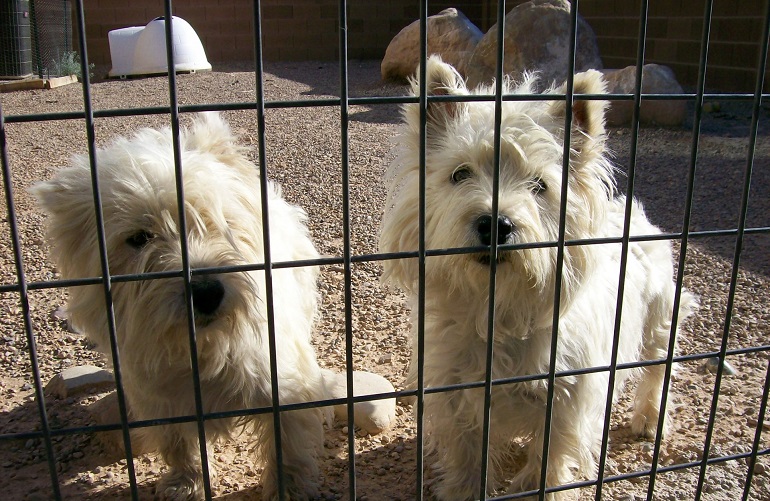
The American Humane Society calls them dog breeding operations. These for-profit puppy mills sacrifice physical and psychological health. These facilities operate under poor conditions and fail to provide essential:
- Adequate shelter
- Support Staff
- Nutritionally consistent food
- Standard sanitation
- Veterinary care to support the breeding dogs or their offspring
- Socializing or exercise facilities
- Love
Once in a while, the nightly news will feature a puppy mill. People become appalled at the horrendous conditions. They wonder why the laws and the animal welfare act don’t stop the abuse.
Yet, thousands are buying puppies from a puppy mill. If we focused on choosing dogs from rescue shelters, puppy mills would run out of business.
Why Are Puppy Mills Legal?
It’s a fair question. The USA has an Animal Welfare Act (AWA). But the animal welfare act and the laws governing pet breeding got lost in the shuffle. Creating and establishing new regulations is a complex process. Much of it happens behind closed doors and leaves loopholes for individuals to exploit.
Dog breeding falls under the USDA, the U.S. Department of Agriculture. One of those loopholes is that the USDA doesn’t have to inspect breeders or pet stores at all. The only facilities that warrant inspection are research facilities that still conduct abhorrent animal testing.
The loopholes also exempt commercial dog breeders from complying with any federal-level regulations regarding:
- Vet care and health programs
- Prescribed exercise or socialization for dogs
- Shelter requirements against extreme temperatures
- Recommendations against wire flooring or stacked cages
- Litters per dog/per year
Although breeders with more than four breeding bitches must obtain a USDA license, it doesn’t protect any of the animals. A bitch can be bred as often as naturally possible without concern for her health.
Most commercial breeders provide enough livable standards for these dogs and puppies to barely survive. It’s legal for a commercial breeder to keep a dog in a wire cage that is merely six inches longer than its body.
For anyone who wants to experience a lifetime of nightmares, read this USDA report on their findings in commercial breeding operations. The humane society can only monitor dog breeding if the United States Department of Agriculture writes laws that protect animals.
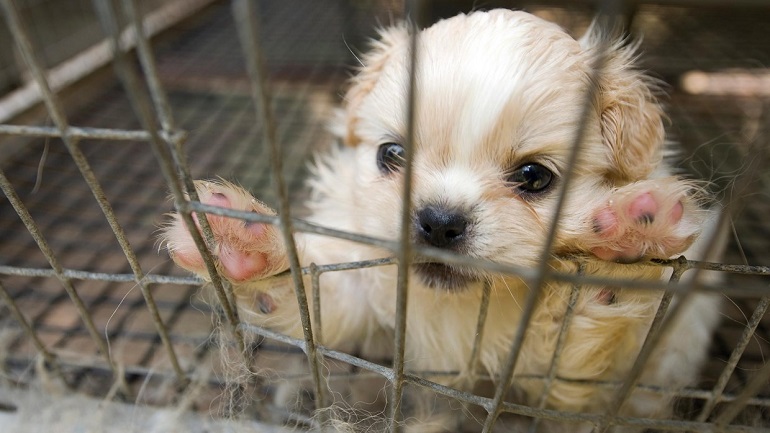
The big question remains. If the USDA and the AWA know about these horrific and inhumane practices, why is nothing being done in many puppy mills?
Enter a barrage of industrial agriculture interest groups and lobbyists who fear protecting dogs in puppy mills will harm farmers and massive industrial organizations under their umbrella. It’s unthinkable to them that if we protect dogs, it will spread to saving cows, chickens, pigs, sheep, and fish.
Several states try from time to time to invent alternative measures to intervene. Pennsylvania created a Dog Law Program (2008). Yet people still need to enforce the rules because legislative efforts can’t manage them.
Likewise, Missouri, when up against giants like Monsanto, Cargill, and other agricultural giants, puppy mills still churn out thousands of abused and neglected dogs.
The plan in Missouri to protect dogs in breeding facilities lasted five months. Then the pressure tactics started. The ‘powers that be‘ amended requirements on living conditions.
AKC (American Kennel Club) also tried. In the end, AKC didn’t provide enough human resources to manage a certification pilot program. The AKC also refuses to take sides and opposes legislation for humane dog breeding standards.
Although the law doesn’t always work, there are many organizations that work tirelessly to stop these dog breeding operations from selling to pet stores. Get involved with:
- The Humane Society of the United States
- The ASPCA
- The Puppy Mill Project
- World Animal Foundation
- Bailing Out Benji
- Hearts United For Animals
- Companion Animal Protection Society
- Stop Online Puppy Mills
- YOU–please get involved and make a difference in any way you can!
What Happens to Puppies in Puppy Mills?
Visiting a puppy mill leaves a devastating impact on your soul. Sadly, puppy mills damage a dog’s well-being, often beyond repair.
Puppies from puppy mills have many health issues. No one in those facilities takes care of their skin, dental needs, matted fur, or emotional needs. There’s no staff to shower these sick dogs with any affection or kindness.
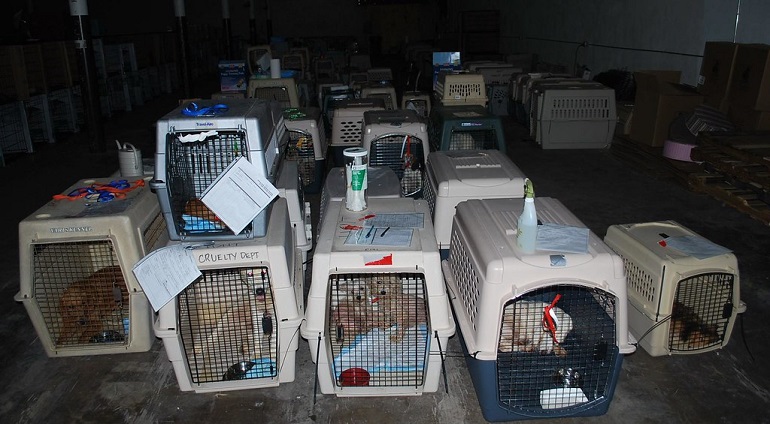
Puppy mill K-9s never wholly recover from their experience at the puppy mill. Many dogs continue to show:
- Fear
- Tension around strangers
- Afraid of noises and sounds
- Unable to build trust around other canines
One of the big questions that often plague people who come across pitiful puppy mill pups is whether they need rescuing and love too. It isn’t easy to walk away from an animal that needs love and care.
By allowing our hearts to lead the way, we only encourage the continuous cycle. It subjects thousands of dogs to physical and mental abuse and neglect. It makes the work of any rescue group even harder.
Puppy mills harm dogs and puppies. While we don’t see the mother at the pet store, she is suffering in a cage somewhere.
Puppy mill canines often come with these health issues:
- Skin disease (from neglect and malnutrition)
- Dental disease and jawbone deformities
- Unkempt hair that blocks bowel movements
- Unnatural fear of people
- Poor social skills
- Timid around normal noises
- Other treatable and preventable canine health problems
- Missing vaccinations and deworming
What dogs in American commercial breeding facilities endure:
- No freedom of movement
- No protection from environmental factors like heat and cold
- Poor sanitation
- No companionship and or playroom
- Mesh wire flooring
- No physical or emotional affection
- Poor access to food and water
- No place to relieve themselves
- Constant noise from other dogs and puppies crying and barking
Whenever a person believes they’re saving a puppy mill canine from a life of misery, they’re actually perpetuating the vicious circle. They’re unwittingly putting money into the hands of unsavory people. Owners from these commercial dog breeding facilities subject animals to abuse.
Puppy Mill Facts and Statistics
When we think of most puppy mills, a shiver runs through us. Our minds won’t let us compute that these horrific places exist. However, according to the Humane Society, the numbers prove that puppy mills thrive:
- 10,000 licensed and unlicensed facilities
- 500,000 dogs in licensed and unlicensed facilities for breeding
- 1,234263 puppies are birthed each year in USDA-licensed facilities
- 1.5 million cats and dogs are euthanized each year from shelters yearly
The American Humane Society works tirelessly to save the lives of innocent animals and animals bred in captivity. They fight against cruel puppy mills and animal lab testing and promote animal health and well-being.
They also work to enlighten future pet owners by providing them with resources to make informed decisions about which pet stores promote the puppy mill trade.

Fight against puppy mills by rescuing a dog or cat instead of buying from pet stores that use an unscrupulous dog breeding operation. For heartwrenching inside puppy mill footage, watch this documentary.
Puppy Mill Regulations
For every law, unscrupulous people find a loophole. California is the first state to ban puppy mills and selling dogs from unlicensed sources. Only registered facilities and breeders can sell puppies. This initiative means that pet stores must legally sell registered puppies.
Maryland, Maine, Illinois, New York, and Washington also passed laws that forbid the retail sale of puppies. Pennsylvania is still fighting to pass a similar law.
Who Enforces These Laws?
Most states need an accountable workforce to enforce the laws. USDA officers seldom make regular visits to puppy mills. There needs to be more people to visit or enforce the regulations as the USDA also oversees wildlife parks, farms, and zoos.
Also, since the laws are vague, inspections tend to be superficial. Commercial breeders are experts at masking the horrific side of the business.
An increase in USDA officers might help. Until we see inhumane breeders brought to justice and penalized, puppy mill offspring will continue to suffer.
What About Anti-Cruelty Laws? Don’t those Affect Puppy Mills?
Anit-cruelty laws are written with the best intention. They look good on paper. However, if there is no punishment to fit the crime, these breeders don’t give a proverbial (insert swear word). It’s about money!
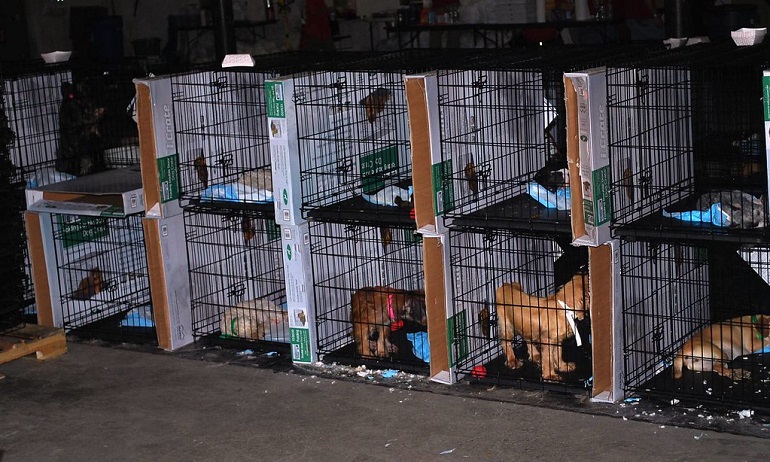
The laws of 50 states governing puppy mills don’t work. These laws treat dogs as agricultural cargo to be harvested. As long as commercial breeders provide basic but crude shelter, food, and water, they navigate the loopholes without consequences.
Although puppy mills operate in our backyards, few government offices or well-meaning organizations have enough authority. Or use the power they have to facilitate visits and fines.
Commercial breeders sell their puppies in bulk. Pet stores that sell puppy mill puppies purchase dogs based on breed, breed popularity, gender, age, and availability. Origin isn’t a concern.
If you know of a commercial breeder and can visit and report them, contact your local authorities like the local Humane Society or RSPCA. In many cases, even reporting unethical breeders isn’t enough to impact any change of consequences.
When local breeders face the consequences of their ill-treatment, it unleashes a massive burden on local resources. Local pet and animal shelters that care for mistreated and unhealthy animals incur enormous costs.
- Vet care and animal medications
- Surgeries
- Food
- Grooming
- Sheltering
Busting criminal dog breeding facilities is costly because of the number of dogs in their possession. Shelters still need to provide shelter care for other abandoned animals in their community.
Here’s where you come in. Even if you can’t adopt a pet, try fostering an animal until a suitable home becomes available. Also, forgo that expensive latte once in a while and contribute to your local animal shelter. They’re doing their best to help as many animals as possible.
Puppy Mills Should Be Illegal
Worldwide, people commit generous acts of caring every second of the day. We strive to improve the condition of our fellow humans and animals. We make an impact on those who need us, whether that is financially or personally.
We rescue animals; we protest animal cruelty. We make personal sacrifices to help save endangered species.
There’s no doubt sometimes we feel overwhelmed by all the bad news.
State Laws
Thousand of well-meaning people contribute where state laws fail. The USDA needs to do more to enforce legislative efforts. Several states are working on creating better regulations to elevate the pressure on the USDA and, finally, help animals in need.
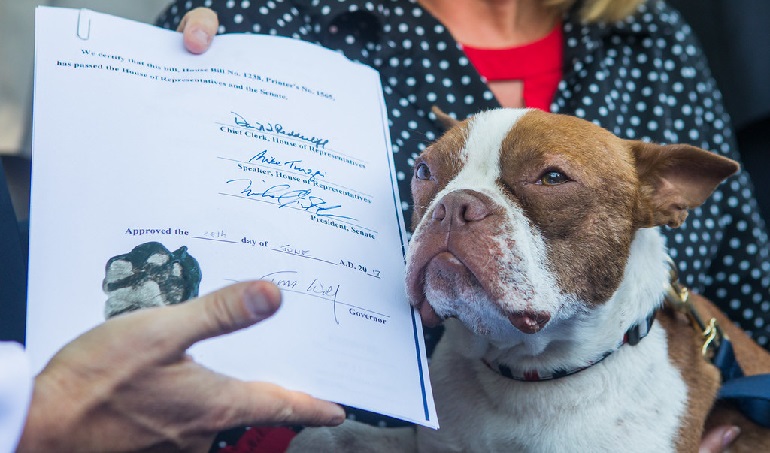
Go to the Animal Defense Fund to see how you can play an active role in your state laws.
Navigating the law is always challenging. If you suspect that your local pet store is selling puppy mill dogs, find out if they have the legal right to do so. And don’t shop there for anything if they do. Talk to your municipal representative and determine your current local law.
How to Stop Puppy Mills?
You stop puppy mills by becoming the voice of puppy mill dogs.
- Call your local representative and make them aware.
- Join forces with anti-puppy mill organizations and help prevent animal abuse.
- Work with the Humane Society and use the scorecard to understand how you and your local representative can help.
- Don’t buy puppy mill dogs, even if it breaks your heart to walk away (alert the authorities).
If in doubt, check it out. Contact the HSUS Puppy Mill Task Force or call 1-877-MILLTIP. Please verify your sources before sending the HSUS out on a call.
When Should You Call The Authorities
Animals without food, water, and shelter need our help. Animals in medical distress require professional care. However, don’t make rash or emotional assumptions about a situation. To help animals in need, local agencies need hard facts.
Call the police or animal organization in your area for advice.
Conclusion
A thousand years from now, people might read the history pages of animal abuse and puppy mills with disgust. Images of broken puppies rescued from mills and the heroes who stepped forward will have a prominent place in museums.
Many people shudder thinking of how we treat our fellow animals and puppy mill dogs. It’s difficult to walk away from a puppy mill puppy that needs and deserves our love too.
We, together, have to break the cycle.
If puppy mills make you cringe, share how you’re making a difference. Do you foster or adopt rescue dogs? Do you have the best family dog who had a horrific start in life? Tell us more about them.


